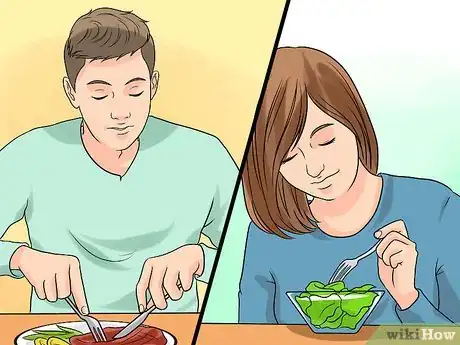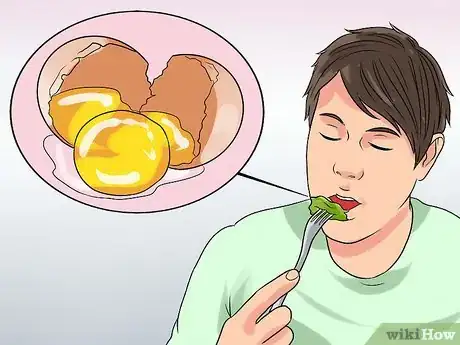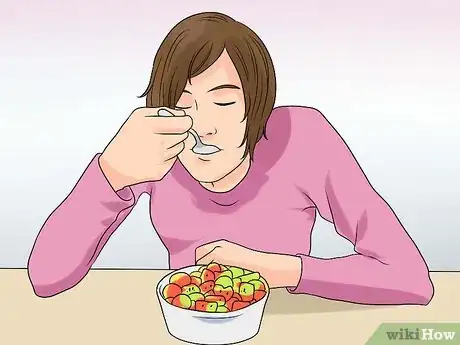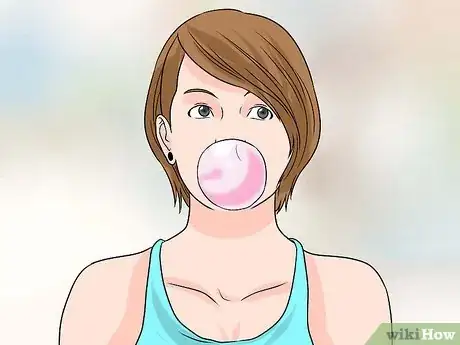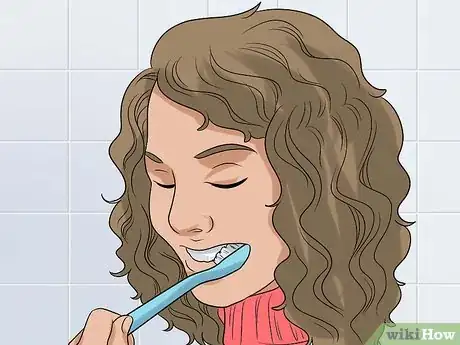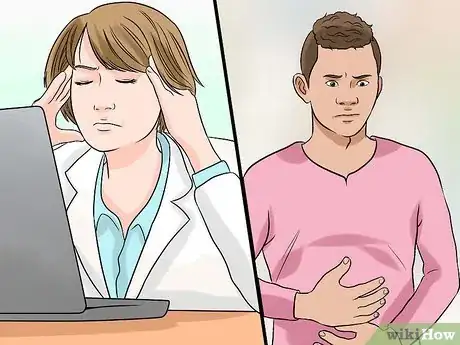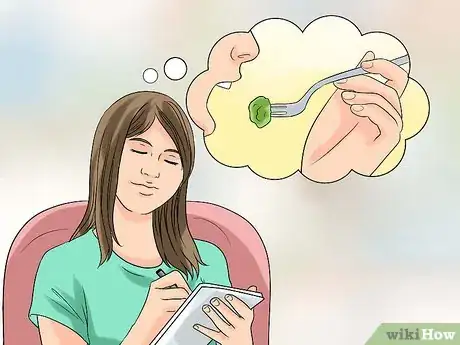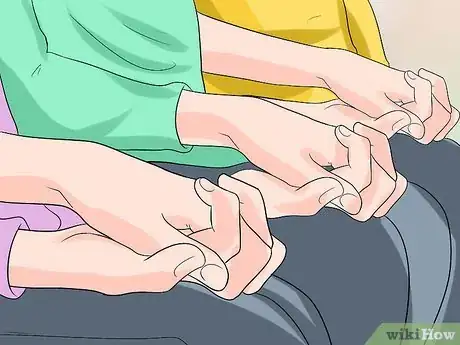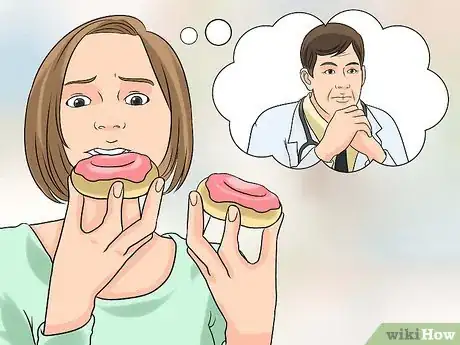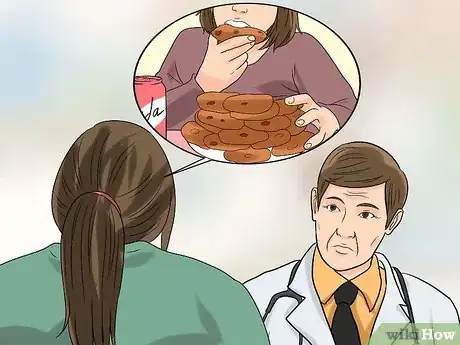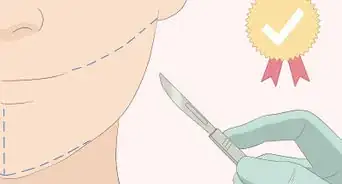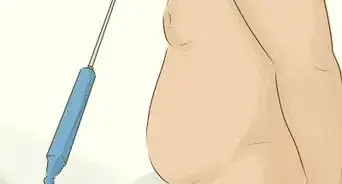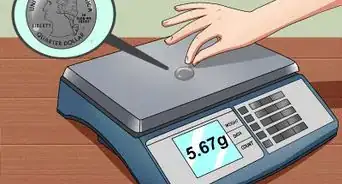This article was co-authored by Claudia Carberry, RD, MS. Claudia Carberry is a Registered Dietitian specializing in kidney transplants and counseling patients for weight loss at the University of Arkansas for Medical Sciences. She is a member of the Arkansas Academy of Nutrition and Dietetics. Claudia received her MS in Nutrition from the University of Tennessee Knoxville in 2010.
There are 10 references cited in this article, which can be found at the bottom of the page.
This article has been viewed 23,113 times.
Managing hunger throughout the your day at work can be difficult. It's especially hard if you work long hours, do not get many breaks to eat during the day or have a stressful and demanding position. Luckily, there are a few things you can change about your diet to help you stay more satisfied during the day and manage those pesky hunger pangs. Eating the right combinations of foods at the right time in addition to tricking your brain into satisfaction can help decrease hunger at work. Practice incorporating a few changes to your diet and meals to help you decrease your hunger and appetite during your day at the office.
Steps
Managing Hunger with Diet
-
1Eat 3-6 meals daily. One of the first methods to managing and decreasing hunger during work hours is making sure that you eat regular and consistent meals. Skipping meals or waiting too long between meals may increase your hunger.
- Studies have shown that regular and consistent meal consumption in addition to a small snack daily lead to decreased hunger throughout the day.
- It's important to eat a minimum of 3 meals daily. However, depending on your schedule and office hours, you may need to eat more meals or include a few snacks during the day.
- Do not skip meals and do not leave more than 4-5 hours of time in between meals without having a planned snack.
-
2Always eat protein. One of the best foods to fight hunger during your work day is protein. Always include a source of protein at each meal and snack.
- Many studies have showed that higher protein diets and higher protein meals keep you feeling more satisfied during your actual meal and for many hours after you're done eating.[1]
- Including a source of protein at each meal and snack can help spread out this hunger-fighting nutrient throughout your entire day. Plan to include 1 or 2 servings (about 3-4 oz) of protein at each meal.
- If you're concerned about calories or watching your waistline, go for leaner sources of protein which are naturally lower in calories and fat. Try: poultry, eggs, low-fat dairy, lean beef, seafood or legumes.
Advertisement -
3Make your meals high fiber. Another important nutrient that can help keep hunger at bay while you're at the office is fiber. Make each of your meals full of fiber to help manage your appetite.
- Studies have shown that those people with higher fiber diets are more satisfied during the day and tend to eat less overall.[2] Fiber provides physical bulk to meals and takes longer to digest.
- Women should aim for 25 grams of fiber daily and men should plan on getting about 38 grams daily.[3]
- Include one or two high fiber foods at each meal and snack. This will help you meet your daily goal but also keep this filling nutrient spread out during the day.
- Foods that are high in fiber include: fruits, vegetables, starchy vegetables and whole grains.
- Meals and snacks that are high in protein and fiber include: Greek yogurt with nuts and fruit, whole grain wrap filled with lean deli meat and cheese with a small fruit salad, a large spinach salad with raw vegetables and grilled salmon or whole wheat pasta tossed with grilled chicken and steamed vegetables.
-
4Drink a lot of water. Another neat trick to manage hunger throughout the day is by drinking enough water. If you typically feel hungry frequently or have difficulty managing your appetite, water may be the answer.
- If you're not getting enough fluids daily or are even just mildly dehydrated, your brain and body may interpret "thirst" as feelings of hunger. You may feel hungry and feel like you need to snack or eat more, when you just need more fluids.[4]
- To ensure you're not making this mistake, make sure you're drinking adequate fluids each day. Aim for at least 8 glasses, but even up to 13 glasses daily.[5]
- Also stick to calorie-free, decaf beverages. These are the best. Try: water, flavored water, sparkling water, decaf coffee and tea.
Tricking Your Brain Into Feeling Less Hungry
-
1Sip on something flavorful. When you're trying to decrease hunger at work while watching your waistline, you may be looking for low-calorie ways to feel more satisfied. Drinking coffee or tea might help.
- Some studies in addition to many anecdotal reports, have shown that coffee helps reduce appetite.[6]
- Sip on some coffee during the day, especially in between meals, to help trick your brain into thinking you're feeling satisfied and less hunger. You can choose either caffeinated or decaf - they both will have the same effect. However, decaf coffee also counts towards your total amount of hydrating fluids for the day whereas caffeinated does not.
- You can also sip on hot tea - like herbal tea. Like coffee, the flavor of the tea can help calm your appetite.
- Skip lots of cream and added sugars. Instead go for a splash of skim milk. Also avoid sugary, sweetened coffee beverages or blended coffees from a coffee shop as these are typically higher in calories.
-
2Chew sugar-free gum or suck on mints. Another quick trick you can start implementing at work is chewing gum or sucking on sugar-free mints.
- Studies have shown that chewing gum or sucking on mints helps you feel less hungry and increases your satiety during the day.
- The action of chewing and flavor of mint signal your brain that you're satisfied even when you really haven't eaten anything.
- Again, if you're watching your weight or total calories go for sugar-free gum or sugar-free mints. It will also benefit your teeth.
-
3Go for a quick walk. Another thing that you can do easily at work is going for a quick walk. This is another easy thing you can do to help manage your appetite while you're at work.
- Studies have shown that aerobic activity, like walking, can help reduce your overall appetite.
- If you're feeling hungry during the day at work, take a quick break and go for a walk. You can even run up and down the stairs a few times if you're able.
-
4Brush your teeth. Pack a toothbrush to bring with you to work. Brushing those pearly whites can help kill hunger and any food cravings.
- Studies have shown that brushing your teeth right after a meal or snack can help signal your brain that you're done eating. The minty and fresh, clean flavor kills any remaining flavors in your mouth.[7]
- Purchase a small travel sized toothbrush and toothpaste tube. Bring these to work and give your teeth a quick brush after lunch or snacks.
Decreasing Head Hunger
-
1Differentiate between physical hunger and head hunger. Although you typically feel physically hungry at some point during your workday, you may also encounter "head hunger" or emotional hunger.
- Learn to differentiate the difference between these two forms of hunger. This may help you realize that you may not be as hungry during your workday as previously thought.
- Head hunger comes from a variety of things. It can be triggered by an afternoon lull in your work or boredom, stress from other co-workers or your boss, increased workload, or underlying emotional issues like depression.
- Typically, emotional hunger comes on suddenly, provides a craving for a very specific food, and persists even after you're full.[8]
- Physical hunger makes you feel empty, like a pit in your stomach and may come along with hunger pangs, a growling stomach and maybe even some irritability or fatigue.[9]
-
2Start a food journal. If you think that some of the "hunger" you experience during your workday may be emotional or head hunger, consider starting a food journal to help you out.
- Begin by tracking all the foods you eat during the day. You may need to bring your journal to work with you or use a smart phone app to keep track of all the snacks or nibbles you eat while you're at work. Note your breakfast, lunch, dinner, snacks and beverages you eat or drink.
- After a few days of this, start adding in feelings and emotions. You can do this periodically throughout the day or at the end of your day. Note if you felt stressed, got in an argument with a co-worker, have been working late hours or if there are stressful things going on at home.
- Begin making associations between your eating habits and your emotions. For example, you snacked all afternoon after getting in an argument with your co-worker. This will show you the "stressor" and your reaction.[10]
-
3Build a support group. If you feel like you're an emotional eater and much of your workday hunger is head hunger, consider building a support group to help you manage this issue.
- Studies have shown that you're more likely to give into emotional eating or head hunger without a support group. This is why it's incredibly important to begin building one.[11]
- Just about anybody you trust can be your support group. Family, friends or even co-workers (especially those who may also be stressed) can be your support. Tell them about your problems and how you're trying to tame your head hunger during the day.
- If you find other people at work in the same boat as you, consider going for a daily walk together during lunch or taking a coffee break together to vent.
-
4Seek behavior therapy. Another option you may want to consider is seeing a behavioral specialist, life coach or therapist. These mental health professionals can give you more in-depth counseling about emotional eating.
- If you're consistently overeating, snacking or eating large portions due to emotional hunger or feeling like you're hungry all during the day at work, consider seeking extra help through behavior therapy.
- Look up a therapist in your area or ask your doctor for a referral. Consider seeing this type of health professional to get extra advice, support and guidance to help curb your emotional eating.
-
5Talk to your doctor. If you continue to struggle with consistent hunger during the day and feel that dietary and lifestyle changes do not make a difference, go see your doctor for further evaluation.
- It's typically not considered normal to feel physical hunger all day long. This is especially true if you're eating regular, nutritious meals and snacks.
- Make an appointment with your doctor to talk about your appetite and hunger struggles. Tell him or her how long you've experienced an increase in appetite and what things you've tried to manage it.
- Update your doctor regularly and keep in touch. This is important to manage any condition you may have.
- Ask for a referral to see a registered dietitian if you feel like your diet could be improved.
Expert Q&A
-
QuestionWhat drug suppresses the appetite?
 Claudia Carberry, RD, MSClaudia Carberry is a Registered Dietitian specializing in kidney transplants and counseling patients for weight loss at the University of Arkansas for Medical Sciences. She is a member of the Arkansas Academy of Nutrition and Dietetics. Claudia received her MS in Nutrition from the University of Tennessee Knoxville in 2010.
Claudia Carberry, RD, MSClaudia Carberry is a Registered Dietitian specializing in kidney transplants and counseling patients for weight loss at the University of Arkansas for Medical Sciences. She is a member of the Arkansas Academy of Nutrition and Dietetics. Claudia received her MS in Nutrition from the University of Tennessee Knoxville in 2010.
Master's Degree, Nutrition, University of Tennessee Knoxville Master's Degree, Nutrition, University of Tennessee KnoxvilleExpert AnswerFocus on diet and exercise before trying any medications. Talk to your doctor before trying any medications or supplements.
Master's Degree, Nutrition, University of Tennessee KnoxvilleExpert AnswerFocus on diet and exercise before trying any medications. Talk to your doctor before trying any medications or supplements. -
QuestionHow do you stop feeling hungry all the time?
 Claudia Carberry, RD, MSClaudia Carberry is a Registered Dietitian specializing in kidney transplants and counseling patients for weight loss at the University of Arkansas for Medical Sciences. She is a member of the Arkansas Academy of Nutrition and Dietetics. Claudia received her MS in Nutrition from the University of Tennessee Knoxville in 2010.
Claudia Carberry, RD, MSClaudia Carberry is a Registered Dietitian specializing in kidney transplants and counseling patients for weight loss at the University of Arkansas for Medical Sciences. She is a member of the Arkansas Academy of Nutrition and Dietetics. Claudia received her MS in Nutrition from the University of Tennessee Knoxville in 2010.
Master's Degree, Nutrition, University of Tennessee Knoxville Master's Degree, Nutrition, University of Tennessee KnoxvilleExpert AnswerEating small, frequent meals throughout the day may help decrease your hunger. Drink plenty of water and eat high-fiber foods such as non-starchy vegetables.
Master's Degree, Nutrition, University of Tennessee KnoxvilleExpert AnswerEating small, frequent meals throughout the day may help decrease your hunger. Drink plenty of water and eat high-fiber foods such as non-starchy vegetables. -
QuestionHow do you make yourself not hungry without eating?
 Claudia Carberry, RD, MSClaudia Carberry is a Registered Dietitian specializing in kidney transplants and counseling patients for weight loss at the University of Arkansas for Medical Sciences. She is a member of the Arkansas Academy of Nutrition and Dietetics. Claudia received her MS in Nutrition from the University of Tennessee Knoxville in 2010.
Claudia Carberry, RD, MSClaudia Carberry is a Registered Dietitian specializing in kidney transplants and counseling patients for weight loss at the University of Arkansas for Medical Sciences. She is a member of the Arkansas Academy of Nutrition and Dietetics. Claudia received her MS in Nutrition from the University of Tennessee Knoxville in 2010.
Master's Degree, Nutrition, University of Tennessee Knoxville Master's Degree, Nutrition, University of Tennessee KnoxvilleExpert AnswerIf you have already eaten a meal or snack, try going for a walk or drinking a glass of water.
Master's Degree, Nutrition, University of Tennessee KnoxvilleExpert AnswerIf you have already eaten a meal or snack, try going for a walk or drinking a glass of water.
References
- ↑ http://ajcn.nutrition.org/content/82/1/1.full
- ↑ http://www.ncbi.nlm.nih.gov/pubmed/3017204
- ↑ http://www.mayoclinic.org/healthy-lifestyle/nutrition-and-healthy-eating/in-depth/fiber/art-20043983?pg=2
- ↑ http://www.health.com/health/m/gallery/0,,20920951_2,00.html
- ↑ http://www.mayoclinic.org/healthy-lifestyle/nutrition-and-healthy-eating/in-depth/water/art-20044256
- ↑ http://www.medicalnewstoday.com/articles/262481.php
- ↑ http://www.forbes.com/sites/jennifercohen/2012/04/10/10-unique-ways-to-kill-your-cravings-and-those-extra-pounds/#1c13b44f4027
- ↑ http://www.everydayhealth.com/diet-nutrition/food-and-mood/your-attitude/physical-or-emotional-hunger.aspx
- ↑ http://www.everydayhealth.com/diet-nutrition/food-and-mood/your-attitude/physical-or-emotional-hunger.aspx
